- Flowers
Flower Bulbs Allium Bulbs Anemones Begonia Tubers Crocus Bulbs Daffodil Bulbs Dahlia Tubers Hyacinth Bulbs Lily Bulbs Tulip Bulbs Woodland Flower Bulbs Other Flower BulbsFlower Plants Annual Bedding Plants Children's Flower Plants Clematis Climbing Plants Cottage Garden Plants Exotic Plants Flowers For Cutting Plants Foliage Plants Greenhouse & Indoor Plants Ground Cover Plants Hanging Basket Plants Lavender PlantsHardy Geraniums Herbaceous Border Plants Heuchera Pansies and Violas Patio Plants Water Plants Window Box Plants Winter Bedding Plants Hydrangea Large impact plants Recommended By Our Experts
- Fruit & Vegetables
- Trees, Shrubs & Ornamentals
- House Plants
- Tool Shed
Garden Tools & Equipment Barrows and Trolleys Garden Solutions Harvesting Plant Supports Seed Sowing Tree Stakes Water Butts Weed Control Hand Tools Secateurs, Snips and Pruners WorkshopGarden Irrigation & Watering Irrigation Kits Water Butts Hoses & Sprays Miscellaneous Fertilisers Plant Pots Hanging Baskets Plant Protection Garden Compost All Compost
- Outdoor Living
Garden Living Barbecues & Firepits Garden Storage Solar Lights & Lighting Fixtures & Ornaments Awnings Sail Shades Garden Clocks Landscaping Lawn Edging PavingPatio Heaters Gas Patio Heaters Electric Patio Heaters Fire Pits, Chimeneas, Fire Baskets Wallmounted/Ceiling Patio Heaters Freestanding/Table Top Patio Heaters Water Features Solar Powered Water Features Mains Powered Water Features Indoor Water Features Outdoor Water FeaturesGarden Furniture Rattan Furniture Parasols Garden Benches Dining Sets Loungers Wooden Furniture Party Tents & Gazebos
- Wild Birds
- Gardening Info
- Special Offers
- • Summer-fruiting raspberries - these plants will produce raspberries between June and early August, depending on the variety you choose. A good example of a summer-fruiting raspberry is 'Ruby Beauty', which has a great flavour and produces abundant fruit.
- • Autumn-fruiting raspberries - these plants will fruit from August to October. Autumn-fruiting raspberries are easier to grow, as they have a very simple pruning system (see later on in this guide). They often require less support than summer-fruiting varieties, and so make good container-grown plants. They are also less susceptible to pests and are reliable fruiters. A great example of an autumn-fruiting raspberry is 'Polka' - a trustworthy variety that will produce huge amounts of delicious fruit.
You might have heard the words ‘primocane’ and ‘floricane’ bandied about in relation to raspberries. These words are just another way to describe the differences between autumn- and summer-fruiting raspberries.
Summer-fruiting raspberries are floricane - they bear fruit on year-old canes. If you’re planting summer-fruiting (floricane) raspberries for the first time, expect to see no fruit in your first year. Berries will grow in the second year when stems are a year old.
Autumn-fruiting raspberries are primocane. This means they will flower and produce fruit on the new stems that grow in the springtime. So, if you’re planting one of these varieties of raspberry, you can expect fruit in the first year.Where to plant raspberries
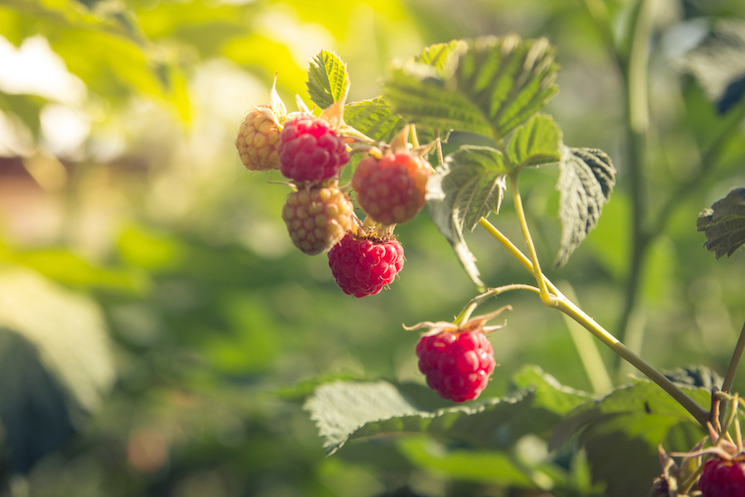
Plant raspberries in a sunny position
Image: Nina EskRaspberries love good, rich, fertile soil to grow in. Pick a spot that is well drained, so that your plants aren’t sitting in water. Raspberries also enjoy a sunny position - some shade is fine, but you'll get the best performance if they’re in the sun.
Summer-fruiting raspberries will need support. You might want to grow them against a trellis, or wall with wires to tie the canes onto. Otherwise, you can install your own framework - see the section below.How to plant raspberries
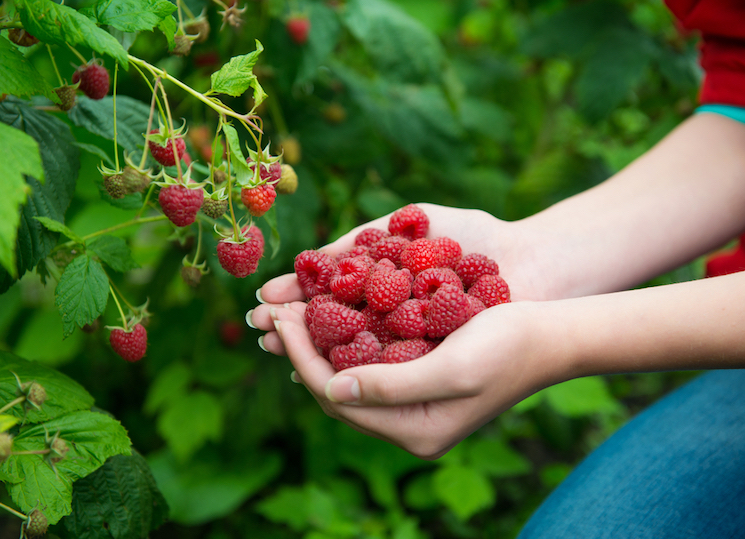
Follow these steps for a healthy, tasty raspberry crop
Image: Draw05If you’re planting raspberries straight into your garden (rather than into a container), follow these steps for a healthy, tasty crop:
- • Dig over the area and add plenty of organic matter, such as compost or well-rotted manure. Raspberry plants need lots of food to help them grow strong and healthy.
- • Prepare a support framework for summer-fruiting varieties (many autumn fruiting raspberries can support themselves). Fix a 6ft (1.8m ) post into the ground at either end of the row you want to grow your raspberries in. Stretch wire between the two posts at approximately 2ft (60cm) intervals, so that you can tie the canes to the wires as they start to grow upwards.
- • Space summer-fruiting raspberries approximately 16" (40cm) apart along the row. Space autumn-fruiting canes about 2ft (60cm) apart.
- • Plant all raspberry canes about 3" (8cm) deep. Plant the canes with roots running horizontally under the ground rather than straight down into it.
- • Water in well.
- • Cut the canes down to about 1ft (30cm) once planted. This will encourage more shoots to appear at the base.
How to grow raspberries in containers
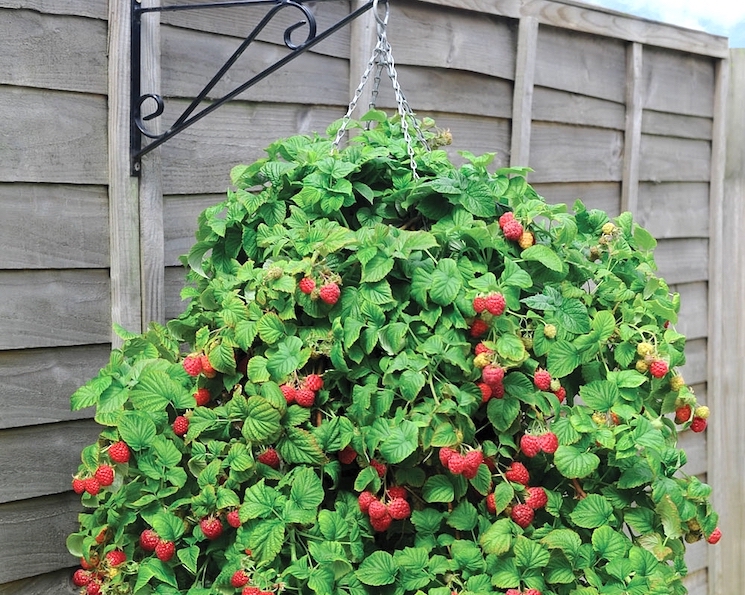
Some varieties are ideal for containers and hanging baskets
Image: Raspberry 'Ruby Beauty' from Van MeuwenRaspberry plants will happily grow in a container, as long as it’s big enough - around 2ft (60cm) in diameter will do. Here’s how to get the best out of your container raspberries:
- • Fill the container with a soil-based compost, like John Innes No.3 - ordinary multipurpose compost tends to dry out too quickly in pots.
- • Plant up to six canes around the edge of the container. Space them evenly.
- • Firm the plants in well.
- • Keep the plants well watered.
- • Feed with a high-potash feed during the season, as this will encourage the plants to flower and produce lots of fruit.
How to look after your raspberries
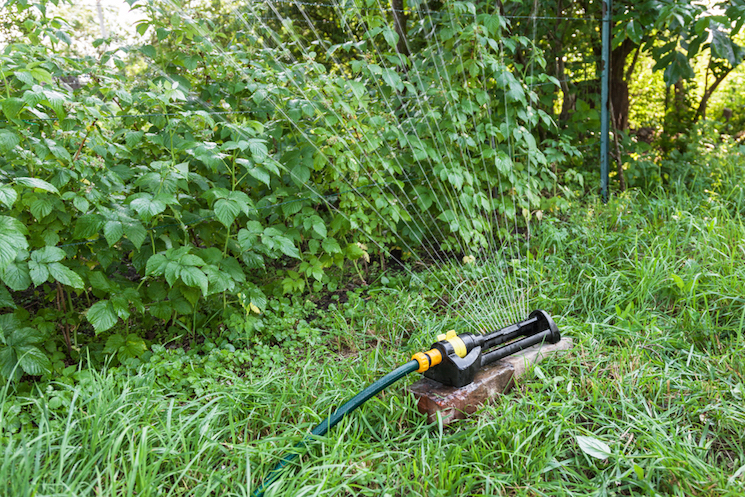
Never let your raspberry plants dry out
Image: Vadym ZaitsevPlenty of food and water is key to a good raspberry crop. In spring, provide a good mulch of well-rotted manure around the base of your plants. This will give them an early boost and keep them nice and strong. The mulch will also help lock in any moisture that’s in the soil.
Never let your raspberry plants dry out, especially during the cropping season. Raspberry roots are close to the surface and can quickly dry out in hot weather. Establish a good watering regime and try to keep them moist at all times.
Over time, raspberry canes will produce "suckers" from their root systems. These can sometimes appear quite a way from the intended row, so it’s best to cut them away from the main root (it won't hurt the plant). If the suckers are large enough you can even replant them.
Cover fruit with a fine net or mesh when it starts to develop, to help protect it from the birds.How to prune raspberries
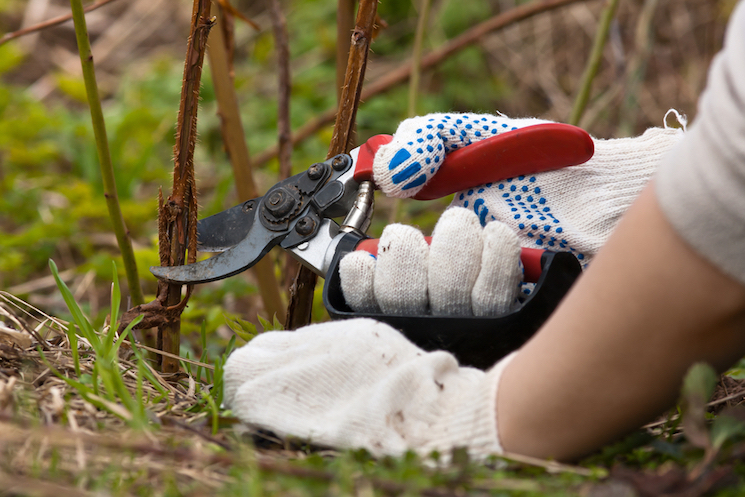
Cut the woody canes of summer-fruiting varieties down to ground level
Image: rodimovPruning raspberries is far easier than you might think. All you need is a decent pair of secateurs and some strong gloves to protect your hands.
First, be sure which type of raspberry you have: summer- or autumn-fruiting.
Autumn-fruiting canes are the easiest to prune, as you can just cut every cane down to ground level after harvesting. All of these will fruit on new growth made during the spring. If they are looking very overcrowded, you can thin the canes down to around 4” (10cm) apart.
Summer-fruiting canes produce their fruit on the previous year’s green growth, so only cut back the canes that bore fruit during the summer. Cut all of this old growth right down to soil level - don’t leave any stubs behind as these can carry disease. It’s easy to tell the difference between the fruited canes (brown and woody) and the fresh new canes (young and whippy).
Aim to keep 6-8 of the strongest new canes and remove the rest. The new canes should be spaced out about 10cm (4in) apart on their support to allow each cane as much light and air as possible.When to harvest raspberries
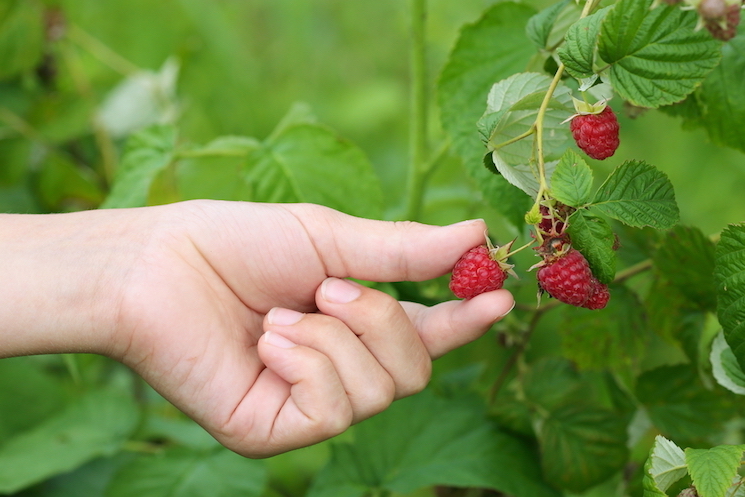
Pick raspberries when they come away easily from the plant
Image: AksenyaThe earliest summer-fruiting raspberries will be ready in early summer, with autumn-fruiting varieties ready in late summer to early autumn.
You’ll know your raspberries are ready to harvest when they come off of the plant easily when gently pulled. If your fruit doesn't easily come away, then it probably isn't completely ripe yet. Choose a dry day for picking.
Eat them fresh, freeze them or make them into jams and preserves to get the most of this versatile fruit.
That’s all you need to know to successfully grow raspberries in your garden. Follow these tips and you can look forward to bumper crops of delicious fruit for years to come.
Join Our Gardening ClubVan Meuwen Gardening Club
Become a Member
Join our Gardening Club to unlock exciting perks and discounts!
JUST £10 for one year's membership
10% OFF EVERY order placed online £20 worth of Van Meuwen Vouchers Exclusive members only deals Join NowHow to grow raspberries
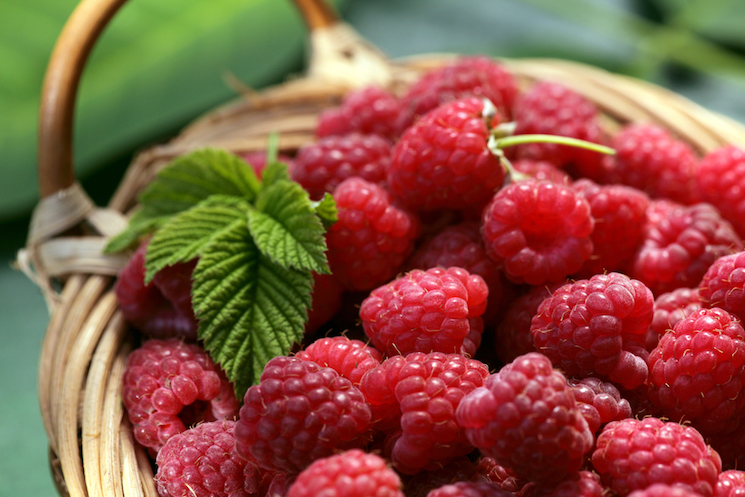
Plant raspberries in the winter for an abundant summer or autumn crop
Image: Shulevskyy VolodymyrRaspberries are easy to grow and delicious to eat. Well-looked-after raspberry canes will continue to bear sensational fruit year after year, making these plants loyal garden friends.
If you’d like to try growing your own raspberries, here’s everything you need to know.When is the best time to plant raspberries?
You can plant raspberries anytime during their dormant season, which is usually between November and March. Make sure the ground is suitable for planting; in other words, not frozen solid or completely waterlogged.
What is the best type of raspberry to grow?
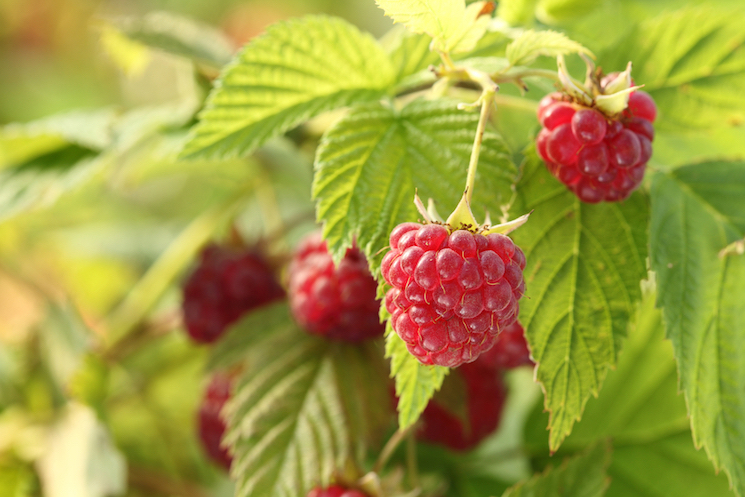
Choose between summer and autumn-fruiting varieties of raspberry
Image: ShutterstockThere are two types of raspberry: summer- and autumn-fruiting.
Sign up to the Van Meuwen Gardener's Club for Special Offers
Delivery Information Privacy Policy Cookies Terms of Business Affiliate Programme Planting & Cultural Advice Contact Us© 2025 Van Meuwen. All rights reserved. A division of Branded Garden Products Limited.

- House Plants
